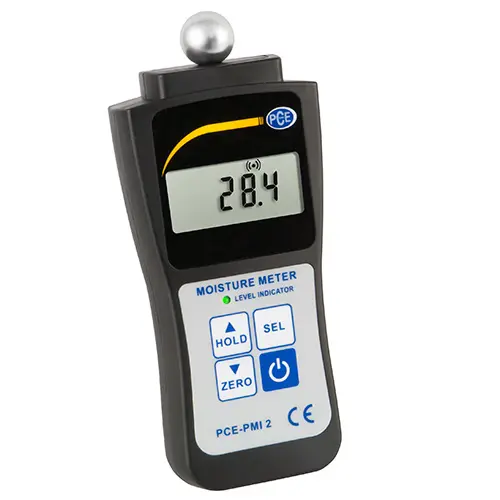The Ultimate Overview to Choosing the Right Moisture Meter for Your Requirements
The Ultimate Overview to Choosing the Right Moisture Meter for Your Requirements
Blog Article
The Ultimate Overview to Moisture Meters: A Comprehensive Summary and How They Can Conserve You Cash
Wetness meters offer as important tools in finding and monitoring moisture content in materials, helping in preventing pricey problems and making sure the high quality of products. Comprehending the subtleties of various types of dampness meters, their applications, and the possible cost-saving advantages they provide can be a game-changer for experts and companies alike.
Types of Moisture Meters
One typical type is the pin-type dampness meter, which gauges the electrical resistance between 2 pins placed into a product. Pinless wetness meters, on the various other hand, use electro-magnetic sensor plates to check a bigger location without creating damages to the material's surface area.

Infrared moisture meters gauge the thermal properties of a product to establish its wetness content non-invasively, making them helpful for applications where pin or pinless meters might not be suitable. Understanding the different types of wetness meters offered can aid markets pick the most proper tool for their specific dampness measurement needs.

Advantages of Making Use Of Moisture Meters
Moisture meters provide important benefits in accurately checking and assessing dampness levels in varied products and environments (Moisture Meter). One of the primary advantages of making use of moisture meters is the avoidance of potential damages triggered by excess wetness. By identifying and attending to high moisture degrees early, wetness meters help to prevent mold development, rot, and architectural damages in buildings, conserving both money and time on repair services. Furthermore, moisture meters help in making certain the high quality of materials during building and construction or manufacturing processes. By properly determining wetness content, these tools assist maintain the stability of timber, drywall, concrete, and other materials, lowering the danger of failings or issues.
Moreover, making use of dampness meters can lead to increased energy effectiveness. In agricultural setups, wetness meters play a crucial duty in enhancing crop yields by making it possible for farmers to keep an eye on dirt wetness degrees and make informed watering choices.
Just How to Choose the Right Dampness Meter
Choosing the ideal moisture meter entails thinking about key factors such as product compatibility, measurement variety, and calibration accuracy. When choosing a dampness meter, it's vital to make certain that the meter is suitable for the specific material you will be screening. Different products have varying electric residential or commercial properties that can influence dampness analyses, so choosing a meter developed for your material is important for accurate results. Additionally, take into consideration the measurement series of right here the wetness meter. Make certain that the meter can discover dampness levels within the variety required for your applications. Calibration accuracy is another critical factor to keep in mind. Go with a dampness meter with trusted calibration to guarantee regular and exact analyses. Some meters may call for routine calibration adjustments, so understanding the calibration procedure is essential. By meticulously examining these factors, you can choose a dampness meter that satisfies your demands and provides accurate dampness measurements for your projects.
Proper Strategies for Dampness Meter Use

Expense Financial Savings Via Dampness Meter Applications
Just how can the tactical use of wetness meters lead to significant expense savings across numerous sectors? In the agriculture industry, dampness meters aid in identifying the ideal time for gathering plants, stopping excess or over-drying dampness that can influence the last item's quality.
Similarly, in construction, moisture meters help prevent expensive problems by finding wetness levels in building products, such as timber or concrete, which can lead to architectural problems otherwise dealt with quickly. By recognizing trouble locations at an early stage, service providers can take restorative steps to avoid considerable repair services or replacements, inevitably conserving time and cash.
Additionally, in the food processing industry, wetness meters are important for keeping track of product high quality and making sure conformity with security guidelines. By properly determining wetness content in foodstuff, makers can stop wasting, maintain freshness, and decrease waste, leading to significant cost savings. In general, the critical application of wetness meters is an important financial investment that can bring about substantial price decreases and boosted effectiveness throughout various industries.
Final Thought
In verdict, wetness meters are important devices for identifying and gauging dampness degrees in numerous materials. By using the ideal moisture meter and complying with correct techniques, users can effectively stop pricey problems caused by excess moisture.
Wetness meters offer as indispensable devices in finding and checking moisture material in materials, aiding in stopping look at this site expensive problems and ensuring the high quality of products. Infrared wetness meters determine the thermal properties of a product to identify its dampness material non-invasively, making them valuable for applications where pin or pinless meters may not be ideal.Moisture meters supply vital advantages in accurately evaluating and keeping an eye on dampness levels in diverse materials and environments. In farming setups, moisture meters play a critical role in optimizing plant yields by allowing farmers to keep an eye on soil wetness degrees and make informed irrigation decisions.In verdict, wetness meters are important devices for determining and detecting wetness levels in different products.
Report this page